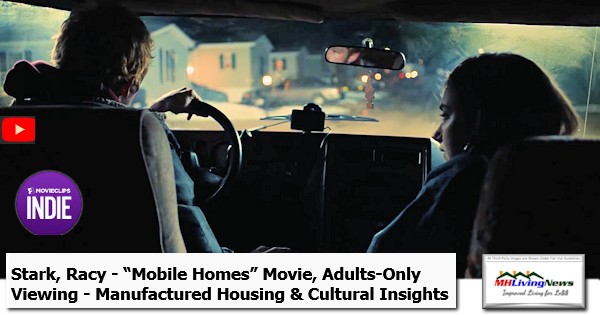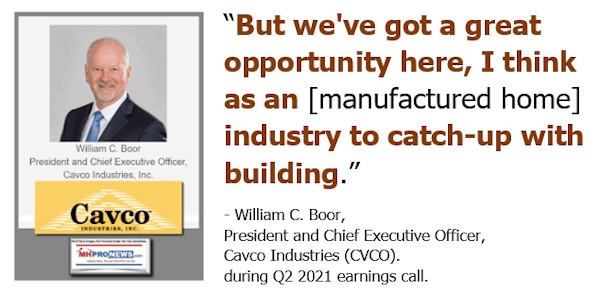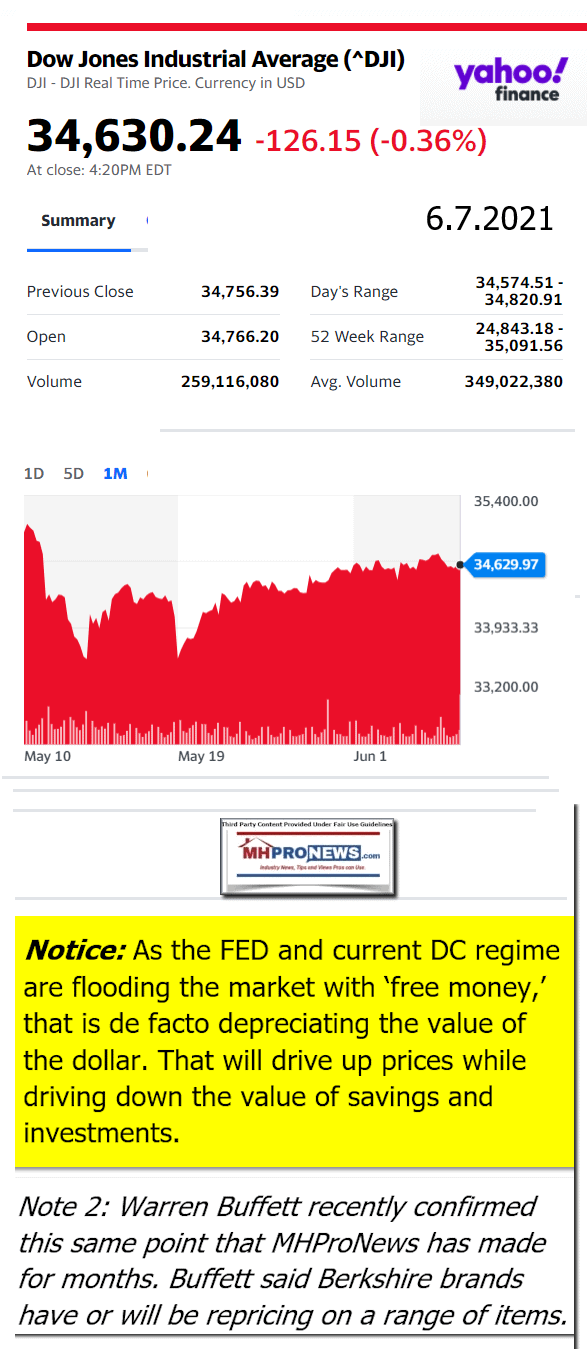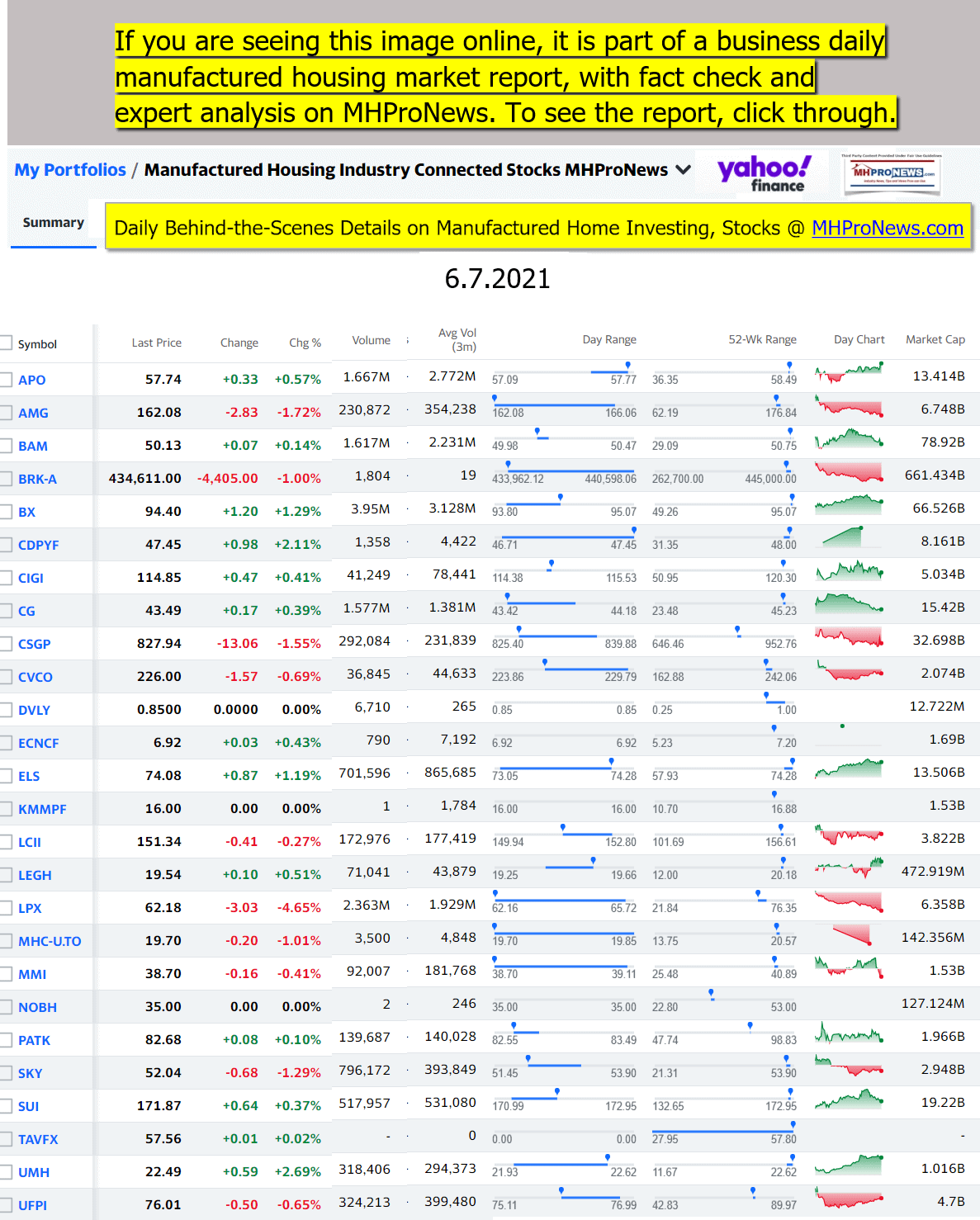In Ready Player One, that director Steven Spielberg movie depicted our affordable homes profession through the dark vision of 50-year-old metal exterior “mobile homes” in ugly, depressing high-rise “stacks.” But in the hit movie, The Minority Report, that hit Spielberg directed flick stating Tom Cruise, Colin Farrell, Samantha Morton, and the late Max Von Sydow projected future shows manufactured homes…not readily apparent at all. Because movies, television, music, books, and other aspects of culture influences life, and the reverse is true too, a look at this hit streaming on Amazon Prime or which can be viewed with ads free on YouTube is useful exercise. Several intellectual but also pragmatic levels of insights are examined below. There is a mix of third-party and original MHProNews analysis. A change of pace from industry political issues is useful too.
Beyond housing, the Spielberg directed film explores several topics that industry professionals, advocates, politicos, and other should ponder. Following our review, which includes third party and original insights, will be the market report for 6.7.2021.
One reviewer on PluggedIn described Minority Report with these opening lines. “In a perfect world, murderers would be caught before they could kill, and the innocent would never live in fear. But even when the coupling of science and humanity produces the tools to prevent crime before it occurs, people still manage to mess things up. It’s 2054. Detective John Anderton is a pre-crime officer in Washington, D.C. He flies around with his jetpack, taking down bad guys before they can do bad things. And then John is identified as a future killer. In an instant, the full weight of the system he’s fought so valiantly for and served so faithfully comes crashing down on top of him.
It’s not a computer or an alien life-force that predicts future killers. It’s three highly-sensitive precognitive people. Since murder so forcefully “disrupts the fabric of life,” that’s what they see the most clearly. Murder after murder after murder after murder…” While that includes a useful description of parts of the Minority Report story line, an objective look at that reveals immediate disconnects. Stating with the writer’s
The first four words above from PluggedIn beg the question — what “perfect world?” The movie makes it clear that crimes and abuses of all types still occur. In this fictional tale, it is only numbers of murders that are supposedly being “prevented.”
And what does that future that the Spielberg directed picture reflect? America around 2054 in and around Washington, D.C. is depicted as a highly stratified society.
- Dingy, old high-rise apartments are apparently where the poor and working-class live-in Minority Report.
- Climbing the economic ladder, there are Georgetown style townhouses for what’s left of the middle class.
- Then the elites and connected have single family homes and walled estates that are often quite opulent.
To Steven Spielberg’s credit, the film explores themes of what big business, big government, justice, law enforcement, privacy rights, and freedom might look like.
Free will vs determinism is another issues considered. Do people have the ability to choose? Essentially, the answer in the movie – and in reality – is answered yes. “You can choose” is a phrase that’s repeated in various ways at key points in the movie. Indeed, that’s true. Which direction we take to drive to a store, appointment, is an example of ‘choice.’ Voting or not, who to vote for or against are other examples.
Capitalism, marketing, crime, and a technocratic future are examined in Spielberg’s look at 2054 too.
Elites and their experts seem to rule, but there is still voting. In that technocratic future, forming the minds of the public is as important as getting the national PreCrime initiative passed. Then, as now, packaging a candidate or initiative are based upon marketing pitches.

They simply accept the system.
Privacy in 2054 is largely lost to a blending of a surveillance state and big capital marketing tied to retinal scans and other intrusive tech. Given that the movie was released in 2002, the suggestion in the Minority Report was prescient with respect to how contemporary giants like Google, Facebook, Amazon, etc. apparently record the purchasing history of any given person. Those tech titans – then and now – use that personalized history to coax individuals into buying more of that item or something that fits with a prior purchase. When ads mysteriously follow you across the internet today, that was presaged by The Minority Report, which takes that technology several steps farther.
One of the themes cited by Wikipedia further below is this quote from Spielberg commenting on the movie. In the post-9/11 America, he said “[w]e’re giving up some of our freedom so that the government can protect us.” The question – is that a worthwhile trade – has been asked often by voices across the left and right, but apparently not in enough an organized fashion to keep that pattern from taking hold.
Other items to ponder from the flick include, in no specific order of importance the following. When something is quoted below, it is per Wikipedia.
- “Other themes include the role of preventive government in protecting its citizenry, the role of media in a future state where technological advancements make its presence nearly boundless, the potential legality of an infallible prosecutor, and Spielberg’s repeated theme of broken families.”
- The fallibility of even impressive tech and the ability to use technology to manipulate people and the legal system.
- That the future is apparently not as bright as people are told. That may explain why substance abuse and various forms of escapism are prevalent, ‘then’ and now.
- Political promises are no better than the person or system making them.
- The dominance of big businesses over smaller ones.
- “The future world in Minority Report of retinal scans, robotic human inspectors, and intrusive, individualized, public advertising arrived in American theaters as the country was debating how much governmental intrusion into personal matters was necessary to ensure safety of its citizens.”
- “Science fiction scholar Gary Westfahl asserts that in a political context, PreCrime may be seen “a metaphor for racial profiling, and one could view the liberation of the precogs as the end of a form of slavery.” While interesting, if so, all of the precogs are fair skinned.
- “Film Criticism, scholar Mark Garrett Cooper…feels that “far from indicting a security state, the film legitimates one.”[23] Gareth Higgins argues that “[t]he government is playing God, using an all-seeing eye to prevent murder.“[4] To Higgins’ point, where are the clear or pervasive references to God? They are apparently missing in 2054.
- To the point above, the apparent blend of the security state tech with big business is insightful, yet disturbing. But in our own time, the Facebook, Instagram, Twitter, et al ban on President Donald J Trump in some ways are akin to a precrime-style indictment by big business. Where are the independent judges and reasonable appeal rights? Someone is tried and convicted at will. So, once more, the film was prescient.
- “The judges appear via video feeds, analyze the images, and according to Cooper, they view the images [generated by the precogs], listen to Anderton rattle off “a string of legalistic verbiage”, then give it a “pro forma ratification.”
- “Spielberg conceived of the idea of a future world permeated with intrusive capitalism and government surveillance after everyone at the “think tank summit” told him that “the right of privacy is a diminishing commodity” which will soon be thrown “right out the window.”[26]According to film critic J. Hoberman, Minority Report “visualizes (as well as demonstrates) a future where the unconscious has been thoroughly colonized.”[27]” It is noteworthy that Speilberg consulted scientists before making the film in an attempt to make life in 2054 as potentially realistic as possible. Habits and repeated conditioning are exploited in that future, but they are exploited now too.
- “The film also presents a future world where government probes use advanced media technology to monitor its citizenry. Cooper says the quandary arises when the film intimates that there were will be no way to escape the media industry’s omnipotence in the future, while at the same time defending “the need for image manipulating institutions.”[23] He feels that this logically raises another issue in that the same concern could be leveled towards image-makers such as DreamWorks, and he says the “film’s virtue lies in provoking this question.”[23] He notes that the film’s tranquil ending concludes with the Andertons looking out into a peaceful exterior with only rain visible, and the precogs reading in their isolated, idyllic farm, and both families apparently free of electronic surveillance.[23]” Cooper raised some interesting points, but the movie itself debunks the notion that there will be a supposed “need to [have] image manipulating institutions.” The fact that crimes are faked and covered up by the manipulating in the movie of a supposedly perfect system demonstrates the fallacy of trusting a few elites to ‘protect people’ from crime or any other darkness.
- The point that almost no one in the movie initially questions the morality of keeping the precogs in their key role is another aspect worth pondering. Rephrased, if someone’s life seems ‘good,’ how much do people actually care about the circumstances of others? That’s not just an interesting question, it is a pressing one. The Walmart Effect and the increasing press of big government blending with big business in surveillance state capitalism are current issues NOW, not just in 2054. Indeed, if changes are not made now, then 2054 may prove darker than the movie suggests.
- The risk of dehumanization of others is well staged by Spielberg. Early in the movie Cruise’s character “Anderton shows little concern for the precogs; when Witwer feels pity for them, he responds: “It’s better if you don’t think of them as human.“[30].” But later, Anderton realizes that it is only by freeing the precog Agatha that he may possibly escape is own errant charge of guilt in a so-called precrime. Sweat shop workers in China, Vietnam, Central America are examples of how this occurs today. Sex workers today are often de facto captives too, even if they might technically be free. That such things – and their underpinnings – are too often not questioned now explains how the fictional world of 2054 could come to be.
- That MHProNews analysis fits what the director himself said. “Spielberg said that Anderton is being punished for his previous callous unconcern for anything but the effectiveness of the PreCrime program. “He’s dirtied by the fact that he doesn’t spend much time thinking about the moral consequences.”
- Additionally, Anderton excuses and hides his personal crime of illegal drug abuse, while he is busy punishing the ‘PreCrimes’ of others who have not actually done the purported deed. The paradox is insightful.
- The Minority Report view of completely automated factories producing futuristic luxury cars begs the question. When only machines build things, where will the income come from for people to buy housing of whatever kind come from?
There is much more that could be explored in this film. But the ponderable topics above illustrate why this is worthy of discussion among friends, family and peers now. “You can choose” doesn’t just apply to Anderton’s ability to decide to kill – or not to kill – on instinct someone he thought might have kidnapped and killed his beloved missing son.
“You can choose” applies to the present and the future that we are forging in America and beyond. That future is being accomplished by numerous current choices made day by day.
Whatever we personally accept, for whatever reasons, that is a brick or a thread in the future of tomorrow.
Anderton, when faced with an injustice in his own life, finally bucks up and challenges the pernicious system that he once defended. So too individuals, smaller, or larger groups today can challenge the troubling mix of surveillance state government-big business, manipulative propaganda media, and the accepted dehumanization of others.
The founders understood that your rights and ours are inexorably tied up with the rights of your neighbors.
Protecting your rights means protecting the rights of others too.
This is why the founders, as imperfect as they were, nevertheless established a system that provided checks and balances against an all-powerful State. The founders also recognized that these had to be girded by morality based upon timely spiritual or religious truths.
Will We the People passively watch such a powerful State arise? Will millions just accept that public officials are de facto deciding what monopolies can exist and spread, and by contrast, what small businesses will be marginalized or snuffed out today?
At what cost will accepting the nexus of big business big government and pernicious propaganda frame our present, future and that of future youth? Spielberg, who along with Cruise and several of the actors in the movie, ironically come from the political left which hails “progressive” thinking that rests on the belief of the technocrats which the Minority Report reveal are not to be trusted.
When people think of ‘progress,’ it is unlikely that they think of a loss of freedom and the rights to personal property, privacy, and other rights are on their mind. Yet that is the fictional and troubling world that Spielberg’s Minority Report creates.
Two mainstream views exploring the movie from others follow. After those, our left-right headlines and market snapshots for 6.7.2021 are provided.
From Movie Locations, are the following.

https://www.movie-locations.com › …
Minority Report | Film Locations
The film is set in Washington DC, but an awful lot of the movie is shot around Los Angeles.
It’s based, like Blade Runner, on a story by Philip K Dickand, like the Ridley Scott classic, part of the movie was shot on the Warner Bros backlot in Burbank. If you take the Warner Bros VIP Studio Tour, you’ll see the street where Detective John Anderton (Tom Cruise) evades arrest with a flying backpack. A false facade was built along one side of the street set to narrow it into a cramped alleyway.
The futuristic department of ‘pre-crime’ is based in Washington DC, where there is some filming around the historic Georgetown district (setting for The Exorcist). The ‘Department of Pre-crime’ exterior is the Reagan Trade Center, 13th and Pennsylvania Avenue NW.
Anderton finds himself mysteriously accused of a ‘pre-crime’, visualised as taking place in a house facing a small park with a merry-go-round. In a sequence not unlike trying to track down a movie location, the house is pinpointed as ‘Barnaby Woods’. The pre-crime scene is the 1700 block of C Street SE at 17th Street SE, in Hill East.
Anderton is obliged to go on the run, but is recognised by his new eyes as ‘Mr Yakamoto’ in the GAP store at 1258 Wisconsin Avenue near M Street, Georgetown.
The waterside home of Anderton’s estranged wife is on Ware Point Road, near Beulah, Gloucester, on Virginia’s east coast. After escaping via a car production line (a sequence dreamed up, but never filmed by, Alfred Hitchcock), Anderton drives the red Lexus through Beaverdam Park, 8687 Roaring Springs Road, Gloucester, on the way to see Iris Hineman (Lois Smith).
Most of the movie, however, was filmed in Los Angeles, and the home of the reluctant inventor of Pre-crime, where Anderton is attacked by poisonous plants, is Descanso Gardens, 1418 Descanso Drive in La Cañada-Flintridge. Seen also in Congo and The Jungle Book. it’s open every day except Christmas.
The scuzzy apartment block where Anderton hides from the spyders was the defunct El Dorado Hotel now beautifully spruced up to become the residential El Dorado Lofts Condominium, 416 South Spring Street, downtown Los Angeles.
Minority Report location: Anderton takes precog Agatha to the Mall:
Hawthorne Plaza Mall, Hawthorne, Los Angeles
The shopping mall, to which Anderton takes precog Agatha (Samantha Morton) is the Hawthorne Plaza Mall, Hawthorne Boulevard at 120th Street, Hawthorne, to the south of Los Angeles. The mall had been closed and shuttered for some time. The mall is seen also in Evolution, Ivan Reitman‘s 2001 attempt to repeat the Ghostbustersmagic, with David Duchovny and Julianne Moore, as the ‘Tokyo’ garage where the kids hang out in The Fast And The Furious: Tokyo Drift, and more recently in David Fincher‘s Gone Girl. In 2011, its lengthy rooftop parking area was transformed into a stretch of freeway for The Green Hornet.
The highrise, where the precogs predict Anderton will shoot Leo Crow, is Angelus Plaza, 255 South Hill Street, downtown Los Angeles. It’s a subsidised condominium of five highrises built for the elderly in 1980 in Bunker Hill, alongside the Second Street Tunnel (itself a frequent filming location seen in Con-Air, Independence Day, The Terminator and The X-Files). It’s the Noontide Northbuilding (the blocks have wonderfully kitschy names – Dawn, Evensong and Jubilate.
It’s back to Washington DC for the premature celebration, as Pre-crime goes national, in the Willard Room of the Willard Washington DC Hotel, 1401 Pennsylvania Avenue NW. The hotel is briefly glimpsed again in Captain America: The Winter Soldier.
##
The following are from Wikipedia on the movie. The full movie with ads is posted below.

The film combines elements of tech noir, whodunit, thriller and science fiction genres, as well as a traditional chase film, as the main protagonist is accused of a crime he has not committed and becomes a fugitive.[6] Spielberg has characterized the story as “fifty percent character and fifty percent very complicated storytelling with layers and layers of murder mystery and plot”.[7] The film’s central theme is the question of free will versus determinism. It examines whether free will can exist if the future is set and known in advance. Other themes include the role of preventive government in protecting its citizenry, the role of media in a future state where technological advancements make its presence nearly boundless, the potential legality of an infallible prosecutor, and Spielberg’s repeated theme of broken families.
The film was first optioned in 1992, as a sequel to another Dick adaptation, Total Recall, and started its development in 1997, after a script by Jon Cohen reached Spielberg and Cruise. Production suffered many delays due to Cruise’s Mission: Impossible 2 and Spielberg’s A.I. running over schedule, eventually starting in March 2001. During pre-production, Spielberg consulted numerous scientists in an attempt to present a more plausible future world than that seen in other science fiction films, and some of the technology designs in the film have proven prescient.
Minority Report was one of the best-reviewed films of 2002 and was nominated for several awards. It received an Academy Award nomination for Best Sound Editing, and eleven Saturn Awardnominations, including Best Actor, Best Supporting Actor, and Saturn Award for Best Music, winning Best Science Fiction Film, Best Direction, Best Writing, and Best Supporting Actress. The film earned over $358 million worldwide against an overall budget of $142 million (including advertising). Over four million DVDs were sold in its first few months of home release.
In April 2054, the federal government is planning to incorporate Washington, DC‘s prototype “PreCrime” police department. It prevents murders through three clairvoyant humans (“Precogs”) attached to a computer that “previsualizes” them. Would-be murderers are then imprisoned in a benevolent virtual reality state. Almost all premeditated, 1st degree murder has ceased, as people have “got the message”, however spontaneous “crimes of passion” are still problematic, as the police have limited time to intercept the killer.
While United States Department of Justice agent Danny Witwer audits PreCrime, the Precogs predicts that in 36 hours, Leo Crow will be murdered by the program’s Captain, John Anderton. Anderton flees the area as Witwer begins a manhunt. Dr. Iris Hineman, the creator of PreCrime technology, reveals secret information to Anderton; sometimes one of the Precogs, usually Agatha, has a different vision than the other two; a “minority report” of a possible alternate future. Anderton kidnaps Agatha, shutting down the group-minded Precogs system. Anderton and Agatha find Crow in his hotel room as the 36-hour time nears. Finding numerous photos of children, including Anderton’s disappeared son Sean, Anderton initially accuses him of being a serial child killer. Crow, however, reveals an unknown entity hired him to plant the photos and be killed in exchange for his family’s financial well-being, and commits suicide.
While Agatha and Anderton don’t find a minority report for Crow, Agatha does show him a murder that occurred five years prior of Ann Lively, Agatha’s mother. She sold her daughter to PreCrime while drug-addicted, and before she tried to reclaim Agatha once she sobered up, she was drowned by a hooded figure. Witwer, while studying Crow’s death, examines the footage of Lively’s murder and finds there were two attempts on her life, the first having been stopped by PreCrime but the second, occurring minutes later, having succeeded. Witwer reports this to the director and founder of PreCrime, Lamar Burgess, who kills Witwer shortly after, but the murder is undetected due to the Precogs being offline.
Although Agatha is reconnected to the PreCrime system, John Anderton is captured and imprisoned for both murders. Burgess accidentally reveals himself as Lively’s murderer to John’s wife Lara. She frees her husband, who then exposes Burgess at a PreCrime celebratory banquet by playing the full video of Agatha’s minority report. Burgess admits that PreCrime could not function without Agatha; he killed Lively following an actual attempt on her life that he had arranged, knowing that the murder would appear as an echo within PreCrime and be ignored.
A new report is generated at PreCrime, indicating that Burgess will kill Anderton. Anderton points out Burgess’ dilemma: killing Anderton will validate PreCrime, sparing Anderton will discredit and shut down the program, and that people, regardless of the system, can change their future once they become aware of it. Burgess commits suicide. Afterwards, the PreCrime system is shut down. All the prisoners are pardoned and released, although many remain under police surveillance for years, and the Precogs are sent away to an undisclosed location to live their lives in peace.
Themes of Minority Report
Minority Report presents a future of increasing electronic surveillance, personalized advertising, and it analyzes the role of media in a future state where electronic advancements make its presence nearly boundless, the potential legality of an infallible prosecutor, and Spielberg’s repeated theme of the broken family. Spielberg’s analysis of the familial aspect was motivated by his own parent’s divorce when he was a child.
Free Will vs Determinism
“We don’t choose the things we believe in; they choose us.”
– Lamar Burgess
The main theme of Minority Report is the classic philosophical debate of free will vs. determinism.[3][4] One of the main questions the film raises is whether the future is set or whether free will can alter the future.[5][6] As critic C. A. Wolski commented, “At the outset, Minority Report… promises to mine some deep subject matter, to do with: do we possess free will or are we predestined to our fate?”[3] However, there is also the added question of whether the precogs’ visions are correct.[5] As reviewer James Berardinelli asked, “is the Precogs’ vision accurate, or has it in some way been tampered with? Perhaps Anderton isn’t actually going to kill, but has been set up by a clever and knowledgeable criminal who wants him out of the way.”[5] The precog Agatha also states that since Anderton knows his future, he can change it. However, the film also indicates that Anderton’s knowledge of the future may actually be the factor that causes Leo Crow’s death. Berardinelli describes this as the main paradox regarding free will vs. determinism in the film, “[h]ere’s the biggest one of all: Is it possible that the act of accusing someone of a murder could begin a chain of events that leads to the slaying. In Anderton’s situation, he runs because he is accused. The only reason he ends up in circumstances where he might be forced to kill is because he is a hunted man. Take away the accusation, and there would be no question of him committing a criminal act. The prediction drives the act – a self-fulfilling prophecy. You can see the vicious circle, and it’s delicious (if a little maddening) to ponder.”[5] Film scholar Dean A. Kowalski argues that in this scenario free will still exists, as the perpetrators control their actions, and the precogs’ visions are but the facts that resulted from their choices.[7]
The central theme of the movie is discussed in the film’s fourth scene. Witwer discusses the PreCrime system with the division’s staff. He believes that its main “legalistic drawback” is that it “arrests individuals who have broken no laws.” Jad responds, “But they will!”[8] When Anderton later arrives upon this discussion, he acknowledges the paradox Witwer raises; that the precogs’ prevent an event accepted as fact, but one which will never happen. To show him that people regularly use predetermination, Anderton picks up a wooden ball and rolls it toward Witwer, who catches it before it lands on the ground.[9] When asked why he caught the ball, Witwer says “Because it was going to fall.” Anderton replies, “But it didn’t.” Then confidently tells him, “The fact that you prevented it from happening doesn’t change the fact that it was going to happen.”[8] Kowalski feels this example is faulty in the sense that the ball has no free will; it merely acts according to the laws of physics, but he acknowledges that if an individual were to have freely chosen to commit murder, then it would hold.[10] Film scholar Stephen Mulhall points out that unlike the laws of physics which have a series of scientifically testable causal laws, Anderton merely has the visions of the precogs’, whose psychic abilities are not fully explained by science.[11]
Another quandary is that if the precogs’ visions are infallible then the future cannot be otherwise, while if they are incorrect people will be punished for crimes they will never commit.[12] Kowalski contends that the precogs only attain knowledge of what he calls the “conditional future”.[13] He cites as evidence two examples: the scene where Agatha steers Anderton through the mall by foreseeing dangerous events and helping him circumnavigate them, and a later scene where she tells Anderton and his ex-wife what would have happened to their child if he had lived. In the first example, Agatha knows what Anderton will freely choose to do when presented with specific facts so she provides them to him, and, in the second, she knows what will have happened to the Anderton’s son based on specific scenarios throughout his life, in which she can see what he would have freely chosen to do, and what selections various people in his life would have freely made.[14] According to Kowalski, the PreCrime unit therefore removes individuals from precise situations where they would freely choose to become a murderer.[15]
Philosophy professor Michael Huemer says “that the only way the otherwise predetermined future seen by the precogs can be averted, we are led to believe, is by the influence of the precogs themselves.”[16]He argues that their “knowledge of their would-be future” enables them to make changes to prevent its occurrence. This means that Howard Marks, the arrested potential killer from the film’s opening scene, is destined to his fate and no action he could undertake would change it.[16] Individuals with minority reports however, have a chance to change their futures according to Huemer, and since there was no minority report (i.e.; no possible alternative fate) for Anderton, he could only change his future by having access to the precogs’ visions.[17] Huemer compares the humans situation to that of a robot; since a robot controls itself, but has a set number of programmed actions, its fate falls within those actions. It lacks free will in the sense that it cannot choose any action outside of its programming, even if one may exist. He also considers a decaying atom which has a 50% chance of survival within the next hour, since the atom has no actions which it can undertake to change those odds, its fate is pure chance. Thus he believes a person needs a set of options, the knowledge of those options, and the ability to choose between them to have free will.[17]
| Political and legal |
Spielberg said that the arrest of criminals before they have a chance to commit their crimes in the movie had some real-world background in post-9/11 America, saying that “[w]e’re giving up some of our freedom so that the government can protect us.”[18] The future world in Minority Report of retinal scans, robotic human inspectors, and intrusive, individualized, public advertising arrived in American theaters as the country was debating how much governmental intrusion into personal matters was necessary to ensure safety of its citizens.[19][20]Spielberg said he would be against a PreCrime system if it were ever possible, as he believes that if it did exist, those in control of it would undoubtedly abuse its powers.[21] Kowalski questions what the benevolent precogs in the film could become in the hands of those who trained their skills for political intrigue.[19] Science fiction scholar Gary Westfahl asserts that in a political context, PreCrime may be seen “a metaphor for racial profiling, and one could view the liberation of the precogs as the end of a form of slavery.”[9]
Kowalski feels the isolation of the precogs ensures that they see their visions merely as facts, and removes them from having to justify them. The precogs’ ignorance of the results of their visions prevents them from knowing the effectiveness of the program. He feels the PreCrime officers are thus more qualified to evaluate their efficacy “than the precogs themselves.”[22] In the December 2003 edition of the academic journal Film Criticism, scholar Mark Garrett Cooper moved past that point by asserting that not only have the precogs “yet to fully understand” their visions, but that the process by which the images are interpreted makes it so that no one individual could understand them without the use of the apparatus.[23] The machinery is so effective and precise according to Cooper however, that the “omnipresent system effectively makes capture more certain than the crime.”[23] When the system targets Cruise, instead of fleeing, he remains in the vicinity in the belief that the system will, in its inexorable logic, correct itself. The apparatus is considered so infallible according to Cooper that Cruise knows once he is cleared by it, his life can immediately return to normal. In this respect, Cooper feels that “far from indicting a security state, the film legitimates one.”[23] Gareth Higgins argues that “[t]he government is playing God, using an all-seeing eye to prevent murder.”[4]
The film presents a legal system where the PreCrime office gathers the images from the minds of the precogs then organizes them into a coherent order for display in front of a set of judges. The judges appear via video feeds, analyze the images, and according to Cooper, they view the images, listen to Anderton rattle off “a string of legalistic verbiage”, then give it a “pro forma ratification.”[23] Thus the accused is never present, is not allowed a defense, and is convicted before he is aware he is on trial.[23]The program is marketed in a similar basic fashion, as in its tag line: “It works.”[24][25] Cooper says that in a typical American courtroom drama, the audience is treated as if it were the jury, but in this system, instead of desiring the hero be proven innocent, the audience seeks instead to have the guilt transferred from Anderton to Burgess. But to do so, Anderton has to disprove the system, which he does by proving the existence of the minority report.[23] This renders the PreCrime justice system inoperable, as if there is doubt related not merely to the gathering of the images, or their ability to be interpreted, but their ability to be correct even in perfect circumstances, then the system of infallible guilt can not exist.[23][24]
| Media |
Spielberg conceived of the idea of a future world permeated with intrusive capitalism and government surveillance after everyone at the “think tank summit” told him that “the right of privacy is a diminishing commodity” which will soon be thrown “right out the window.”[26] According to film critic J. Hoberman, Minority Report “visualizes (as well as demonstrates) a future where the unconscious has been thoroughly colonized.”[27] When the movie first appeared in theaters a common source of reviewers’ complaints was the film’s product placement, which they found intrusive.[28] Film scholar Martin Hall says that the purpose of the advertisements Anderton runs into are “encouraging him to buy certain products and, by extension, affirm his place in society.”[29] The personalized advertising is disconcerting partly because of the invasion of privacy, but also, argues Cooper, because it is cold, impersonalized, and insincere.[23]
Cooper discusses how he feels Minority Report emphasizes the future importance over the control of imagery. According to him, the images captured from the precogs’ visions in the film bestow power on those who control their processing. He says the film warns viewers that those who control images must be carefully overseen so as to prevent the abuse of power, and that the film presents “governance as a problem of image arrangement.”[23] The film also presents a future world where government probes use advanced media technology to monitor its citizenry. Cooper says the quandary arises when the film intimates that there were will be no way to escape the media industry’s omnipotence in the future, while at the same time defending “the need for image manipulating institutions.”[23] He feels that this logically raises another issue in that the same concern could be leveled towards image-makers such as DreamWorks, and he says the “film’s virtue lies in provoking this question.”[23] He notes that the film’s tranquil ending concludes with the Andertons looking out into a peaceful exterior with only rain visible, and the precogs reading in their isolated, idyllic farm, and both families apparently free of electronic surveillance.[23]
| Self-perception |
Writing in the academic journal Rhizomes, scholar Martin Hall, while analyzing the movie, discusses the self-perception an individual develops based on the views of those outside of themselves.[29] The academician notes that when a child first comprehends the function of a mirror, they begin to develop the understanding that their perception of themselves is not self-contained, and learn partly they are what they see in the mirror. He contrasts this to when Anderton discovers the precogs’ vision of his future self.[29] At the beginning of the film, Anderton shows little concern for the precogs; when Witwer feels pity for them, he responds: “It’s better if you don’t think of them as human.”[30] Shortly thereafter, however, Anderton is shown in tears at his home, high on the hard drug neuroin while mourning the loss of his son.[31] Agatha enters a similar period of self-examination when she has visions of her mother’s death, and is informed they are merely “echoes” i.e. a faulty image in her memory.[29] Anderton becomes flustered when he begins to interpret the images which show him about to commit murder and begins to frantically sort through, According to Hall he begins “searching for whatever possible versions of this representation are available to him, other than the one that represents him as a murderer.”[29] Hall says that he is sorting through the images so feverishly, as he is convinced once they are sorted properly and understood, they will not show him to be the murderer, because he is convinced that he is not a murderer.[29] He literally becomes obsessed with himself,[29] seeking to resolve these images with put him at “discordance with his own reality.”[29]Previously, at peace with himself, Hall says Anderton cannot accept the image he sees in the precogs’ visions.[29] Unable to reconcile the two, Hall says that he is forced to decide that “it is likely that errors have occurred” in the PreCrime system.[29]
When he escapes the building and enters the mall, Hall feels he is disturbed by advertisements calling to him by name not only because they will give away his presence, but also because they remind him of his lost place in society, and he begins “to see through the false consciousness his (illusory) previous position as fixed subject had allowed him.”[29] Spielberg said that Anderton is being punished for his previous callous unconcern for anything but the effectiveness of the PreCrime program. “He’s dirtied by the fact that he doesn’t spend much time thinking about the moral consequences. It’s just like a sporting event almost — and then suddenly that whole sporting event makes him the soccer ball.”[32] His doubts about his own future lead him to examine his previous life to better understand himself according to Hall. He runs through his role in the PreCrime system, and his son’s disappearance “to reconstruct his past.”[29]After Leo Crow in fact kills himself, Anderton becomes healed, and later has “recreated himself as the subject he was previously through the knowledge that he is not a killer.”[29] Although he has satisfactorily repaired his self-image, Anderton is not the same person, as he not longer believes in the PreCrime system.[29] Hall says that Burgess’ final dilemma; namely, his desire to keep PreCrime running, his inability to bring himself to kill Anderton, and his desire to live, drives him to see his only suitable action to be suicide. “Burgess has been left truly alone by events,” argues Hall. “His wife fainted when she saw the images of the murder and Anderton has been the cause of this rupture.”[29]
| Broken family |
I still carry my childhood along with me. I’m old enough now to compartmentalise it—so I consciously try not to go too far back into my childhood, but the subconscious part of me still creates traces of it in Minority Report. Tom Cruise has suffered a tragic personal loss—he has lost his child and his wife has left him. It still reminds me of the divorce of my parents. As much as I try to get away from it I still can’t avoid it.
— Spielberg[33]
Minority Report also continues Spielberg’s tradition of depicting broken families.[34][27] In Dick’s short story, Anderton is a childless, married man whose main motives are self-preservation and preventing the disassembly of the PreCrime division. While he is also trying to save himself in the movie, his greater concern is uncovering the story behind his son’s disappearance. Spielberg would later transform his next science fiction film, War of the Worlds, from a story about a single man to one about a divorced father concerned with protecting his children.[35]Buckland notes that the two tragic parent-child relationships in the picture (Agatha and Ann Lively, John and Sean Anderton) have a common element. The movie has four shots of them submerged in water. Agatha’s face is shown in a close up shot, taken from directly above her, when she is submerged in her photon milk, nutrient bath. When photos of her mother’s submerged corpse are shown to her, the emphasized photograph is a similar image of her face taken from directly above. Anderton and his son are shown together in a pool flashback scene in which they have a contest to see who can hold their breath longest. John is underwater when his son is taken, and later in the apartment he is shown lying motionless, immersed in a filled bathtub, in a manner Buckland finds similar to the shots of Agatha and Ann.[36] Buckland notes that co-screenwriter Frank introduced the water theme, as he wrote Agatha and her mother’s back stories while adding the bathtub scene.[37]”
###
It is worth noting that the treatment of manufactured housing in movies is often lacking in several ways. Product placement in media was an issue raised on MHProNews about a decade ago. We have periodically raised the topic of how media treats our profession, because it matters.

Cavco Industries Bill Boor was correct when he said that the industry has an opportunity right now to catch up with building, because of the high demand for housing which conventional builders can not keep up with. The question is, what specific steps are the powers that be taking to make that statement more than just nice sounding words?

Next, is our evening market report and related left-right headlines.
Stock Market Updates and Business Daily Market Moving Left (CNN) – Right (Newsmax) Headlines Snapshot. While the layout of this business daily report has recently been modified, several elements of the basic concepts used previously are still the same. The headlines that follow below can be reviewed at a glance to save time while providing insights across the left-right media divide. Additionally, those headlines often provide clues as to possible ‘market moving’ items.
Market Indicator Closing Summaries – Yahoo Finance Closing Tickers on MHProNews…


Headlines from left-of-center CNN Business = evening of 6.7.20
- Surprise signing bonuses
- Companies you’d never expect are offering cash incentives to new employees
- Dollar doldrums are back as inflation worries heat up
- Americans are still sitting on loads of stimulus cash
- Elon Musk cancels the 500-mile range version of Tesla’s Model S
- Low inventory. Bidding wars. Buying a home feels near impossible
- Google fined $270 million in France for unfair advertising practices
- Opinion: I’ve dealt with racism as an Asian American. Here’s how business leaders can support the AAPI community
- Attacked, rejected and harassed: Asians around the world speak out on workplace discrimination
- Microsoft removed ‘Tank Man’ images on Tiananmen Square’s anniversary
- Burger King trolls Chick-fil-A with LGBTQ+ donations
- Hybrid working is going to be tricky. Here’s how to do it right
- FaceTime iOS 15
- Apple unveils iOS 15 with new features for post-pandemic life
- NORRIDGE, ILLINOIS – JUNE 01: A sign hangs outside of an AMC theater on June 01, 2021 in Norridge, Illinois. Mudrick Capital has agreed to purchase 8.5 million share of the theater chain for $230.5 million.
- These AMC insiders sold $8 million of stock during last week’s boom
- 2022 GMC HUMMER EV
- Why electric cars are so much heavier than regular cars
Headlines from right-of-center Newsmax – evening of 6.4.2021
- DOJ: ‘We’ve Turned the Tables’; Most Bitcoin Recovered in Colonial Attack
- “Earlier today, the Department of Justice has found and recaptured the majority of the ransom Colonial paid to the DarkSide network in the wake of last month’s ransomware attack. Ransomware attacks are always unacceptable — but when they target critical infrastructure, we will spare no effort in our response,” Deputy Attorney General Lisa Monaco said during a news conference on Monday.
- Newsmax TV
- Ed Rendell to Newsmax: Some Nontraditional Infrastructure Must Stay in Bill
- Burgess to Newsmax: Fauci Must Testify To Congress Again |
- Dershowitz to Newsmax: Trump’s Enemies Weaponizing Law Against Him |
- Matt Gaetz to Newsmax: ‘Fauci Has Blood on His Hands’ |
- Michael Oren to Newsmax: ‘It’s Always Premature to Eulogize Benjamin Netanyahu Politically’ |
- Owens to Newsmax: NFL Hypocritical on BLM, Race-Norming |
- More Newsmax TV
- Newsfront
- Iran Weeks Away From Nuclear ‘Breakout’ as Biden Team Mired in Confusion
- The United States still does not know whether Iran is ready to resume compliance with its 2015 nuclear deal and if Tehran continues to violate the pact, the “breakout time” it needs to amass enough fissile material for a single nuclear weapon will shrink to weeks….
- DeSantis Signs Bills Fighting Chinese Communist Party’s Influence in U.S.
- Florida Gov. Ron DeSantis signed two bills on Monday that seek to
- Trump, O’Reilly to Team Up for ‘History Tour’ at Four Venues
- Former President Donald Trump is hitting the road in Florida and
- Tim Scott: ‘Resilient’ America’s Best Days ‘Ahead of Us’
- America’s ability to overcome adversity has shown the country can do
- Supreme Court Rules Against Permanent Residency Right for Illegal Migrants
- The U.S. Supreme Court on Monday refused to let immigrants who have
- Related
- Supreme Court Spurns Challenge to Male-Only Military Draft Sign-Up
- UFO Probe May Show China, Russia Dominate US in New Tech Frontier
- A widely anticipated report on unidentified aerial phenomena may not
- Newsmax Remains Top 50 News Site, With Big Traffic Growth
- Britain’s Press Gazette reports that Newsmax is a top 50 global news
- Scientists Argue COVID-19 ‘Genetic Footprint’ is Unnatural
- Two scientists argued in an opinion piece for The Wall Street Journal
- Third Virginia Sheriff Quits Dems, Switches to Republican Party
- A sheriff in Smyth County, Va., who has twice been elected as a
- States Fight to Limit Governors’ Pandemic Powers
- State legislatures rendered bystanders by numerous U.S. governors who
- Banks Brace for Cyber Attacks in 2021
- SPONSOR: Emerging cybersecurity threats in 2021
- Trump: Zuckerberg ‘Broke Law’ with Dropboxes
- Mark Zuckerberg, Founder and CEO of Facebook, Inc. is under heavy
- Related
- Trump Praises Joe Manchin for Opposing End to Filibuster
- Trump Says ‘Sure’ to DeSantis as Possible 2024 Running Mate
- Trump Says ‘Scam’ Bitcoin Competing Against US Dollar
- Trump: ‘I’m Not the One Trying to Undermine American Democracy; I’m the One That’s Trying to Save It’
- Trump: World Must Say in One Voice ‘China Must Pay’
- Trump: We’re Going to Take Back WH ‘Sooner Than You Think’
- New York Planning Mass Concert in Central Park
- New York City is planning on holding a large-scale concert in Central
- China & U.S Replacing Cash With Digital Money
- SPONSOR: Their new digital currency is backed by gold
- Wall Street’s Palm Beach Foray Fuels Developer Office Rush
- First came the pandemic migration of New York financiers to West Palm
- The Newsmax Daily with Rob Carson: Donald Trump’s Epic Return To The Stage!
- PLUS: Joe Biden delivers a disturbing, apocalyptic address to United
- Legalized Pot Causing Changes to States’ K-9 Units
- The legalization of marijuana in an increasing number of states has
- Leftist Riots Likely to Sweep Peru if Vote Holds as DC on Edge
- Official Washington DC is starting to grow concerned over the growing
- FDA Approves Much-Debated Alzheimer’s Drug Panned by Experts
- Government health officials on Monday approved the first new drug for
- JPMorgan Freezes Donations to Republicans Who Contested 2020 Election
- JPMorgan Chase & Co will resume making political donations to U.S.
- Poll: No Early ‘Biden Bounce’ to US Image in France, Germany
- The United States’ reputation as the leading global power has
- Ukraine’s Zelensky Hits Biden for Waiving Sanctions on Nord Pipeline
- Ukrainian President Volodymyr Zelensky says the Nord Stream 2 gas
- DOJ: Most Bitcoin Recovered in Ransomware Attack on Colonial Pipeline
- S. Justice department says it seized 63.7 bitcoins valued at $2.3
- Marc Short: Focus Must Be on 2022, Not Pence’s Future VP Chances
- It’s “foolish not to focus on 2022” rather than focusing on questions
- Biden Invites Zelensky to WH, But Not Until After Putin Summit
- President Joe Biden is inviting Ukrainian President Volodymyr
- Gottlieb: COVID Booster Vaccines Could Be Needed This Fall
- Fully vaccinated Americans should feel safe this summer against
- Russia Upset Over Ukraine’s New Soccer Uniforms
- Russia has harshly criticized Ukraine for its national team’s new
- Israeli Police Bar Right-Wing March Through Jerusalem’s Old City
- Israeli far right groups scrapped a planned march through Jerusalem’s
- Supreme Court Spurns Challenge to Male-Only Military Draft Sign-Up
- The U.S. Supreme Court on Monday declined to hear a challenge by a
- Clarence Williams III, ‘The Mod Squad’s’ Linc, Dies at 81
- Clarence Williams III, who played the cool undercover cop Linc Hayes
- Schumer Facing Mounting Pressure as Biden Agenda Slowly Collapsing
- Six months into the partys hold on Washington, with Joe Biden in the
- Jeff Bezos to Join Winner of Seat on Blue Origin Space Flight
- com Inc founder Jeff Bezos and his brother will join the
- Trending News
- More Newsfront
- Finance
- Flush With Stimulus Cash, Consumers Are Spending More: BofA CEO
- Bank of America Corp. Chief Executive Officer Brian Moynihan said consumer spending has surged amid the reopening, much of it fueled by leftover stimulus money.”Our consumers have lots of money in their checking accounts,” Moynihan said Sunday on CBS’s “Face the Nation.”…
- Google Overhauls Global Ad Model After $268 Million French Fine
- Stephen Moore: Biden’s ‘Backwards Energy Policy’ Cripples US
- States Rebound from Bleak Forecasts to Pass Record Budgets
- El Salvador President Wants Bitcoin as Legal Tender
- More Finance
- Health
- ‘Next Big Wave’: Radiation Drugs Track and Kill Cancer Cells
- Doctors are reporting improved survival in men with advanced prostate cancer from an experimental drug that delivers radiation directly to tumor cells. Few such drugs are approved now, but the approach may become a new way to treat patients with other hard-to-reach or…
- COVID Vaccine-Reluctant Not Changing Their Minds, According to New Poll
- New Report: Masks/Social Distancing Halved the Risk for Catching COVID-19
- Many Existing Drugs Could Be Potent COVID Fighters: Study
- Just Two Daily Fruit Servings Lowers Diabetes Risk
Manufactured Housing Industry Investments Connected Equities Closing Tickers
Some of these firms invest in manufactured housing, or are otherwise connected, but may do other forms of investing or business activities too.
-
-
-
-
-
-
-
-
-
-
-
-
- NOTE: The chart below includes the Canadian stock, ECN, which purchased Triad Financial Services, a manufactured home industry lender
- NOTE: Drew changed its name and trading symbol at the end of 2016 to Lippert (LCII).
- NOTE: Deer Valley was largely taken private, say company insiders in a message to MHProNews on 12.15.2020, but there are still some outstanding shares of the stock from the days when it was a publicly traded firm. Thus, there is still periodic activity on DVLY.
-
-
-
-
-
-
-
-
-
-
-







Spring 2021…
Berkshire Hathaway is the parent company to Clayton Homes, 21st Mortgage, Vanderbilt Mortgage and other factory built housing industry suppliers.
· LCI Industries, Patrick, UFPI, and LP each are suppliers to the manufactured housing industry, among others.
· AMG, CG, and TAVFX have investments in manufactured housing related businesses. For insights from third-parties and clients about our publisher, click here.
Enjoy these ‘blast from the past’ comments.
MHProNews. MHProNews – previously a.k.a. MHMSM.com – has celebrated our 11th year of publishing, and is starting our 12the year of serving the industry as the runaway most-read trade media.
Sample Kudos over the years…
It is now 11+ years and counting…
Learn more about our evolutionary journey as the industry’s leading trade media, at the report linked below.
· For expert manufactured housing business development or other professional services, click here.
· To sign up in seconds for our industry leading emailed headline news updates, click here.
Disclosure. MHProNews holds no positions in the stocks in this report.





That’s a wrap on this installment of “News Through the Lens of Manufactured Homes and Factory-Built Housing” © where “We Provide, You Decide.” © (Affordable housing, manufactured homes, stock, investing, data, metrics, reports, fact-checks, analysis, and commentary. Third-party images or content are provided under fair use guidelines for media.) (See Related Reports, further below. Text/image boxes often are hot-linked to other reports that can be access by clicking on them.)

By L.A. “Tony” Kovach – for MHProNews.
Tony earned a journalism scholarship and earned numerous awards in history and in manufactured housing. For example, he earned the prestigious Lottinville Award in history from the University of Oklahoma, where he studied history and business management. He’s a managing member and co-founder of LifeStyle Factory Homes, LLC, the parent company to MHProNews, and MHLivingNews.com. This article reflects the LLC’s and/or the writer’s position, and may or may not reflect the views of sponsors or supporters.





























